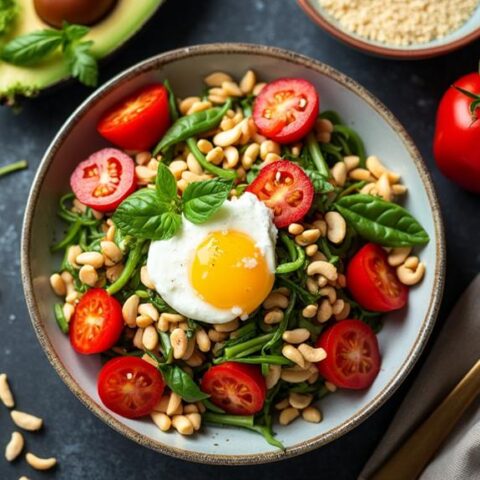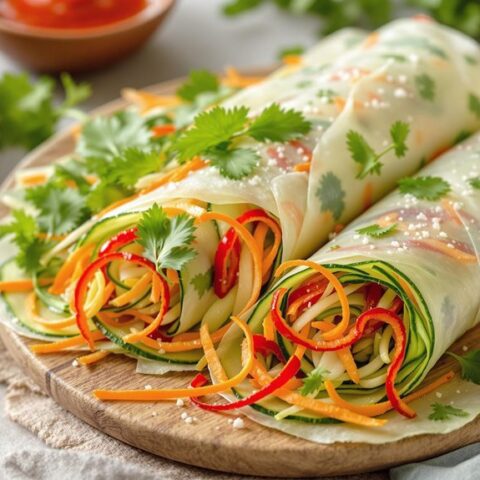
Mung bean sprouts are indeed compatible with a ketogenic diet, providing only 3.39 grams of net carbs per 100 grams, which fits well within the low-carb requirements of keto. They are rich in nutrients such as protein, fiber, vitamins, and essential amino acids, contributing to overall health and electrolyte balance. Unlike many beans, their fiber content aids digestion without compromising ketosis. Additionally, their minimal fat content pairs effectively with high-fat keto foods to maintain ketosis. Incorporating bean sprouts can enhance dietary diversity while adhering to keto guidelines, and exploring their versatility could uncover more benefits and uses.
Key Takeaways
- Mung bean sprouts have 3.39g net carbs per 100g, making them suitable for keto.
- Low carbohydrate content helps maintain ketosis while providing essential nutrients.
- High fiber content aids digestion and supports metabolic health on keto.
- Mung bean sprouts are versatile for salads, stir-fries, and soups in keto meals.
- Their nutrient density includes antioxidants, vitamins, and minerals beneficial for keto dieters.
Understanding the Keto Diet
The ketogenic diet, often lauded for its transformative potential, hinges on a fundamental nutritional shift from carbohydrates to fats as the primary source of energy. This dietary approach requires reducing daily carbohydrate intake to less than 20 grams, thereby promoting a state of ketosis.
In ketosis, the body becomes efficient at burning fat for fuel, which can lead to significant health benefits such as weight loss and improved blood sugar control. To achieve and maintain this state, it is vital to monitor net carbs—the total carbohydrates minus fiber—in foods consumed.
The keto diet typically incorporates high-fat foods such as meats, dairy, and healthy oils, while advocating for moderate protein intake. Non-starchy vegetables are encouraged, providing essential nutrients without exceeding net carb limits. For instance, leafy greens like spinach are nutrient-dense and low in carbs, making them ideal for keto meals.
This meticulous tracking of net carbs is essential to guarantee adherence to the diet's stringent carbohydrate restrictions. The dietary plan shares similarities with other low-carb diets like Atkins but distinguishes itself by its pronounced emphasis on fat intake.
Bean Sprouts Nutritional Profile
Mung bean sprouts provide a nutritionally advantageous profile for individuals adhering to a ketogenic diet, primarily due to their low carbohydrate content of approximately 3.39g of net carbs per 100g serving.
Despite their minimal caloric impact, with only 31 calories per one-cup serving, they offer a beneficial nutrient density, including 3.2g of protein and 1.9g of fiber.
This composition not only supports metabolic health but also enhances the overall nutrient intake when incorporated into a keto meal plan.
Low Carb Content
Bean sprouts, particularly those from mung beans, are a favorable inclusion in a ketogenic diet due to their low carbohydrate content. Mung bean sprouts provide approximately 3.39 grams of net carbohydrates per 100 grams, making them a suitable choice for those adhering to a ketogenic lifestyle. This low carb profile is achieved by their total carbohydrate content of around 4.19 grams per 100 grams, from which 0.8 grams are dietary fiber. This fiber not only supports digestive health but also aids in reducing the net carbohydrate count, which is critical for maintaining ketosis.
A standard serving of one cup of raw mung bean sprouts, weighing about 104 grams, contains roughly 6.2 grams of total carbohydrates, with 1.9 grams attributed to fiber, effectively lowering the net carb intake.
In addition, mung bean sprouts are exceptionally low in fats, containing only 0.09 grams per 100 grams. This feature is compatible with the high-fat demands of a ketogenic diet, allowing for flexibility in fat intake from other sources.
Moreover, mung bean sprouts offer 2.03 grams of protein per 100 grams, providing a modest source of plant-based protein while keeping carbohydrate levels minimal, consequently aligning well with ketogenic principles.
Nutrient Density Benefits
Celebrating their nutrient density, mung bean sprouts offer a compact source of essential nutrients that can enhance a ketogenic diet.
These sprouts are not only low in carbohydrates but also pack a variety of nutrients that support overall health. When considering their nutritional profile, mung bean sprouts are a beneficial addition to a keto-friendly meal plan.
Here are some key elements of their nutrient composition:
- Low Carb Content: Mung bean sprouts contain approximately 3.39g of net carbs per 100g serving, making them an excellent low-carb option for those adhering to a ketogenic diet.
- Protein Contribution: With about 2.03g of protein per 100g, mung bean sprouts provide a modest amount of protein, which is essential for muscle repair and maintaining nutritional balance.
- Fiber-Rich: Containing around 0.8g of fiber per 100g, these sprouts support digestive health and can help maintain a feeling of fullness, which is advantageous for weight management.
- Antioxidant Boost: The sprouting process enhances the antioxidant content of mung bean sprouts, which contributes to improved immune function and overall health benefits.
Incorporating mung bean sprouts into a ketogenic diet not only aligns with low-carb requirements but also enriches the diet with essential nutrients and health benefits.
Caloric Impact Analysis
Building on the nutrient density benefits of mung bean sprouts, an analysis of their caloric impact reveals their potential as a low-calorie food option within a ketogenic diet. With approximately 31 calories per cup (104 grams), mung bean sprouts serve as an excellent choice for those seeking to minimize caloric intake while adhering to ketogenic principles.
Their net carb content of about 3.39 grams per 100 grams underscores their compatibility with keto, enabling individuals to maintain ketosis with a limited carbohydrate intake.
The nutritional profile of mung bean sprouts includes 3.2 grams of protein and a minimal 0.2 grams of fat per cup, offering a well-rounded addition to ketogenic meals without compromising macronutrient balance.
Additionally, the presence of essential minerals such as potassium and magnesium plays a pivotal role in supporting overall health, which is particularly beneficial for those following a ketogenic lifestyle.
Moreover, the process of sprouting mung beans reduces both their caloric and carbohydrate content, while simultaneously enhancing nutrient availability. This makes mung bean sprouts a strategically advantageous inclusion in a low-carb diet, promoting health while aligning with the ketogenic macronutrient framework.
Sprouting and Its Benefits
Sprouting, a process that involves soaking and rinsing seeds, beans, or grains to initiate growth, considerably boosts nutrient availability and digestibility. This technique is particularly beneficial as it enhances the nutritional profile of foods like mung bean sprouts, which are among the most common sprouted varieties.
Sprouting increases antioxidant levels and free amino acids, providing a more nutrient-dense food source than unsprouted beans. The reduction of caloric content and carbohydrates during sprouting is advantageous, offering a potentially better dietary option for those aiming to minimize caloric intake.
Nutritional Benefits of Sprouting
- Enhanced Antioxidant Content: Sprouting mung beans increases the concentration of antioxidants, essential for combating oxidative stress and promoting cellular health.
- Increased Free Amino Acids: The process raises levels of free amino acids, important for protein synthesis and muscle repair.
- Mineral Richness: Sprouted mung beans are abundant in potassium and magnesium, minerals crucial for cardiovascular health and metabolic function.
- Improved Digestibility: The fiber content in sprouted beans aids digestion and may contribute to lower blood pressure levels.
Engaging in sprouting is not only nutritionally beneficial but also serves as an educational activity that fosters healthy eating habits among both children and adults.
Keto-Friendly Bean Sprouts
Mung bean sprouts are an excellent keto-friendly option, with only 3.39g of net carbs per 100g, fitting seamlessly into low-carb dietary frameworks.
These sprouts can be easily incorporated with high-protein keto foods like fatty fish and fresh meats, enhancing meal diversity while maintaining ketosis.
Their minimal fat content allows them to be easily paired with higher-fat foods, which is advantageous for maintaining the macronutrient balance essential to ketogenic diets.
Additionally, their fiber content supports digestive health, making mung bean sprouts a valuable nutritional component for those pursuing ketosis.
Low Carb Content
Bean sprouts, particularly those from mung beans, are an excellent low-carb option for individuals adhering to a ketogenic diet.
These sprouts contain approximately 3.39g of net carbs per 100g serving, making them suitable for maintaining ketosis while providing essential nutrients. Their low carbohydrate content is balanced with high fiber, minimizing the impact on blood sugar levels and enhancing digestion.
Here's a closer look at why mung bean sprouts are ideal for keto:
- Net Carbs: With only 3.39g of net carbs per 100g, mung bean sprouts fit seamlessly into a keto meal plan, allowing for flexibility in carb allocation.
- Fiber Content: A typical serving size of 104 grams contains 1.9g of fiber, effectively reducing the net carbohydrate intake to maintain a state of ketosis.
- Total Carbohydrate Content: At 4.19g per 100g, their total carbohydrate content is low, with minimal sugars, supporting low-carb dietary goals.
- Pairing Potential: Due to their low-fat content of 0.09g per 100g, mung bean sprouts pair well with high-fat foods, essential for a balanced ketogenic diet.
Nutritional Benefits
Among the myriad of vegetables suitable for a ketogenic diet, bean sprouts, particularly those from mung beans, stand out due to their impressive nutritional profile. Mung bean sprouts provide approximately 3.39 grams of net carbohydrates per 100 grams, a serving size that aligns well with the low-carb requirements of keto adherents.
Their low-calorie content, approximately 31 calories per 104-gram cup, offers flexibility in meal planning, facilitating the maintenance of caloric deficits essential for weight management.
The fiber content of mung bean sprouts, about 1.9 grams per cup, contributes to digestive health and aids in prolonging satiety, which is beneficial for those managing hunger on a ketogenic dietary regimen.
Despite their minimal fat content of just 0.2 grams per cup, mung bean sprouts can be seamlessly incorporated into high-fat meals, thereby supporting the dietary fat intake vital for sustaining ketosis.
Moreover, the sprouting process enhances nutrient bioavailability, making these sprouts a potent source of antioxidants and essential amino acids.
These nutrients are indispensable for overall health, providing cellular protection and supporting protein synthesis. Consequently, mung bean sprouts are not only keto-friendly but also nutritionally advantageous, enhancing dietary quality with each serving size.
Incorporating Bean Sprouts
Incorporating bean sprouts into a ketogenic diet is a strategic choice for those seeking to maintain low carbohydrate intake while enhancing their meals with nutritional benefits. Mung bean sprouts, with approximately 3.39g of net carbs per 100g serving, offer a suitable and versatile option for keto followers.
Like other non-starchy vegetables, bean sprouts are nutrient-dense, providing essential vitamins and fiber without disrupting low-carb goals. Their crunchy texture and mild flavor allow them to be easily integrated into a variety of dishes without markedly increasing carbohydrate content.
Consider the following ways to incorporate bean sprouts into your ketogenic meal plan:
- Salads: Add mung bean sprouts to salads for a revitalizing crunch, boosting both texture and nutrient diversity without exceeding carb limits.
- Stir-fries: Their low net carb content makes them an excellent addition to vegetable stir-fries, providing volume and subtle flavor while keeping fat intake balanced.
- Soups: Enhance the nutritional profile of soups by adding bean sprouts, which can improve digestion and nutrient absorption due to their high fiber content.
- Pairing: Complement the low-fat content of bean sprouts with higher-fat foods such as avocado or nuts to create balanced, ketogenic meals that support metabolic health.
Incorporating these strategies guarantees that mung bean sprouts contribute effectively to a ketogenic diet while offering health benefits.
Recipe Ideas With Bean Sprouts
When considering keto-friendly recipes, mung bean sprouts offer a versatile and low-carb option, with only 3.39g of net carbs per 100g serving.
These sprouts can be combined with different low-carb greens such as spinach or kale to enhance the nutritional value of salads or stir-fries. Quick stir-fry dishes, such as a Low Carb Asian Stir-Fry, highlight their ability to add both crunch and flavor while adhering to ketogenic guidelines.
Additionally, incorporating bean sprouts into salads like a Korean mung bean salad not only maintains a low carbohydrate profile but also enhances nutritional diversity with essential nutrients and fiber.
Quick Stir-Fry Options
For those seeking a quick and nutritious meal option, stir-frying bean sprouts presents an ideal solution that aligns well with keto dietary principles. Mung bean sprouts, containing only 3.39g of net carbs per 100g serving, are a versatile ingredient for low-carb stir-fry dishes, making them an excellent choice for those maintaining a ketogenic lifestyle.
Here are some quick stir-fry ideas to contemplate:
- Classic Stir-Fry: Incorporate mung bean sprouts with vegetables such as bell peppers and garlic chives. These vegetables not only enhance the flavor but also keep the dish crunchy and keto-friendly.
- Protein-Packed Option: Pair bean sprouts with proteins like chicken or shrimp. This combination boosts nutritional value while maintaining a low carb count, generally under 5g per serving.
- Flavorful Additions: Use sesame oil for a rich, nutty flavor, or add peanuts for a crunchy texture, both of which complement the bean sprouts while ensuring the dish remains keto-compatible.
- Simple and Fast: With a cooking time often under 10 minutes, these stir-fry options are not just healthy but also convenient for those with busy schedules seeking quick, nutritious meals.
Bean Sprouts in Salads
Adding bean sprouts to salads can greatly enhance both the nutritional profile and texture of the dish. With only 3.39g of net carbs per 100g serving, they are an excellent choice for those following a ketogenic diet. Their satisfying crunch complements a variety of salad ingredients, such as leafy greens, cucumbers, and carrots, all while contributing 2.03g of protein per serving. This low-carb profile allows for the inclusion of other keto-friendly components, such as keto chicken, without surpassing carbohydrate limits.
Incorporating bean sprouts into salads also offers versatility in flavor. Marinating them with low-carb dressings, such as sesame oil or vinegar-based options, can enhance their taste while maintaining the salad's keto-friendly status.
A particularly nutrient-dense and invigorating salad idea includes combining bean sprouts with avocado and cherry tomatoes, topped with sesame seeds. This combination not only delivers essential nutrients but also provides a variety of textures and flavors.
For a more substantial meal, consider adding grilled keto chicken to the bean sprout salad. This addition increases the protein content, making the salad a well-rounded, satisfying dish suitable for a ketogenic lifestyle.
Nutritional Benefits of Sprouts
Boasting a remarkable nutrient profile, mung bean sprouts provide numerous nutritional benefits that are particularly advantageous for those adhering to a ketogenic diet. With only 3.39g of net carbs per 100g serving, they are an ideal low-carb option for this dietary regimen. This makes them easy to incorporate into meals without exceeding daily carb limits.
The process of sprouting greatly enhances nutrient availability, leading to increased levels of antioxidants, vitamins, and essential amino acids — nutrients vital for overall health and well-being. Furthermore, mung bean sprouts are low in fat, containing just 0.09g of fat per 100g, making it simple to pair them with high-fat ketogenic foods.
Their high fiber content, approximately 0.8g per 100g, supports digestive health and aids in maintaining a healthy gut, a vital aspect for individuals on a low-carb diet. Additionally, they are rich in potassium and magnesium, two key minerals that help maintain electrolyte balance and support numerous bodily functions.
Remarkably, the ketogenic diet enhances fat oxidation, making it beneficial to include low-carb, nutrient-dense foods like mung bean sprouts into your diet plan.
Here's a concise summary of their benefits:
- Low net carbs: 3.39g per 100g
- High fiber: 0.8g per 100g
- Rich in nutrients: Antioxidants, vitamins, amino acids
- Essential minerals: Potassium and magnesium
Comparing Bean Varieties
When considering bean varieties suitable for a ketogenic diet, it is vital to evaluate their carbohydrate content and nutritional profile. Mung bean sprouts emerge as a favorable choice, offering approximately 3.39 grams of net carbs per 100 grams. Their low-carb nature enables inclusion in keto diets with minimal impact on daily carbohydrate limits.
Similarly, black soybeans stand out with only 0.8 grams of net carbs per 100 grams, making them one of the most keto-compatible options available for individuals aiming to maintain a low carbohydrate intake per day.
Regular glucose monitoring is important when including these low-carb options to guarantee they align with your overall dietary goals and maintain safe ketone levels.
Traditional soybeans, while slightly higher in net carbs at 2.4 grams per 100 grams, remain within the acceptable range for many ketogenic meal plans.
Snap beans, or green beans, provide 4.7 grams of net carbs per 100 grams, offering a moderate carbohydrate content that can be managed within a keto regime.
Finally, soybean sprouts contain 5.7 grams of net carbs per 100 grams. Although higher in carbs compared to mung bean sprouts, they can still be included in moderation for those carefully monitoring their carbohydrate consumption per day.
Each variety provides distinct nutritional benefits, allowing for diverse menu planning within the constraints of a ketogenic lifestyle.
Cooking Tips for Bean Sprouts
Exploring the culinary potential of bean sprouts reveals their versatility and nutritional advantages within a ketogenic diet. With approximately 3.39g of net carbs per 100g serving, bean sprouts are a low-carb option that can enhance various dishes with their crisp texture and subtle flavor.
Here are some expert cooking tips to maximize their benefits:
- Quick Sauté: A brief sauté in a hot pan with minimal oil preserves the crunch and nutritional value of bean sprouts. This method guarantees that they retain their desirable texture, making them a perfect addition to stir-fries and salads.
- Flavor Enhancement: To uplift the natural taste of bean sprouts, consider adding aromatic ingredients like garlic chives or ginger during cooking. These additions can provide a depth of flavor that complements the sprouts beautifully.
- Stir-Fry Technique: Bean sprouts need only 2-3 minutes of stir-frying to achieve an ideal crunch. This quick cooking time makes them an ideal ingredient for those looking to prepare a nutritious meal swiftly.
- Hygiene Practices: Prior to cooking, it is essential to rinse and wash bean sprouts thoroughly. This step eliminates potential bacteria, safeguarding their freshness and safety when incorporated into dishes like soups or wraps.
Pairing Sprouts in Meals
Bean sprouts' low carbohydrate content and crisp texture make them an ideal component for enhancing a variety of ketogenic meals. With approximately 3.39 grams of net carbs per 100 grams, they seamlessly integrate into low-carb diets without significant carbohydrate impact. Make sure to pair them with proteins like chicken, shrimp, or tofu to boost the nutritional profile and flavor while maintaining keto compatibility. Including bean sprouts in salads or stir-fries not only introduces a satisfying crunch but also enhances fiber content, promoting satiety.
Moreover, bean sprouts can substitute traditional noodles in dishes like chow mein or pad thai, offering a similar texture while ensuring low carbohydrate intake. For added flavor, they can be combined with low-carb sauces, garlic, and spices, making them a versatile ingredient in a range of keto recipes. Here is a table illustrating potential meal pairings with bean sprouts:
| Protein Source | Meal Type | Flavor Enhancer |
|---|---|---|
| Chicken | Stir-fry | Low-carb soy sauce |
| Shrimp | Salad | Lemon garlic dressing |
| Tofu | Noodle substitute | Chili garlic sauce |
| Beef | Soup | Ginger and scallions |
| Pork | Wraps | Spicy peanut sauce |
These combinations make sure to keep meals both delicious and keto-friendly.
Frequently Asked Questions
How Many Carbs Are in Bean Sprouts?
Bean sprouts contain approximately 5.94 grams of carbohydrates per 100 grams, with net carbs at 3.39 grams. They offer significant nutritional benefits, making them a suitable low-carb option for various diets, including ketogenic plans, when consumed moderately.
What Vegetables Are off Limits on Keto?
Under Keto Guidelines, vegetables high in carbohydrates, including potatoes, corn, peas, and carrots, are typically off-limits due to their potential to disrupt ketosis. Starchy vegetables and those with high sugar content are similarly restricted.
Can Sprouts Be Eaten in a Keto Diet?
Sprouts, particularly mung bean sprouts, can be included in a ketogenic diet due to their low net carbohydrate content and high nutrient density. They provide essential vitamins and minerals, supporting overall health while maintaining ketosis effectively.
What Beans to Avoid on Keto?
On a ketogenic diet, avoid high-carb keto legumes like chickpeas, kidney beans, black beans, pinto beans, and lima beans. These legumes exceed acceptable carbohydrate limits, hindering ketosis. Opt for low-carb alternatives to support metabolic goals.
Conclusion
The inclusion of bean sprouts in a ketogenic diet can be considered viable due to their low carbohydrate content and high nutritional value. Bean sprouts offer essential nutrients such as vitamins, minerals, and antioxidants while maintaining a minimal impact on daily carbohydrate limits. Their versatility allows easy incorporation into various meals, enhancing both flavor and nutritional profile. When evaluating bean sprouts for a keto regimen, their nutrient density and compatibility with dietary restrictions affirm their suitability as a healthy, keto-friendly option.









No Comments